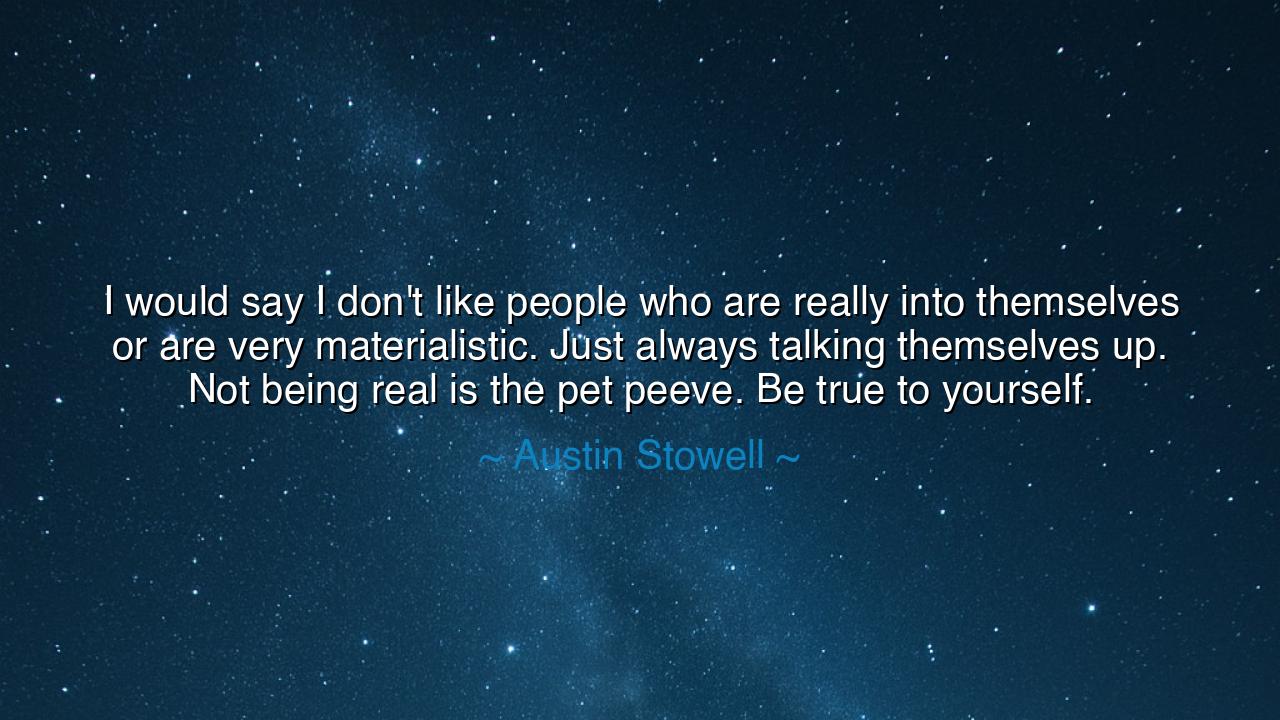
I would say I don't like people who are really into themselves
I would say I don't like people who are really into themselves or are very materialistic. Just always talking themselves up. Not being real is the pet peeve. Be true to yourself.






Hear the words of Austin Stowell, who spoke with clarity and conviction: “I would say I don’t like people who are really into themselves or are very materialistic. Just always talking themselves up. Not being real is the pet peeve. Be true to yourself.” At first, this may sound like the common lament of one weary of arrogance. Yet beneath it lies an eternal call to authenticity, a warning against vanity, and a reminder that truth of character is worth more than all the riches and adornments of the earth.
The heart of the saying is this: self-obsession blinds, while authenticity frees. The man who is endlessly “into himself” builds a prison of mirrors, where he sees only his own reflection and never the faces of others. The materialistic man builds altars of gold and cloth, mistaking possessions for worth, yet finding himself emptier with every treasure gained. To Stowell, the greatest irritation—the pet peeve—is not wealth itself nor even ambition, but the falsehood that arises when one is consumed with appearances and pride.
The ancients knew well the poison of vanity. Consider the tale of Narcissus, who gazed upon his reflection until he wasted away, unable to love anything but the image of himself. His story was not merely myth, but warning: to be consumed with one’s image is to perish in spirit, even while alive. By contrast, the philosophers of Greece praised authenticity, urging men to “know thyself” and live in harmony with their true nature. To “be true to yourself,” as Stowell exhorts, is not modern advice, but an ancient commandment, spoken at Delphi and carried through the ages.
History also offers its lessons. The court of Louis XIV of France, the Sun King, was filled with nobles who sought only to display their power through jewels, silks, and the endless boasting of titles. Yet in their obsession with appearances, they neglected the needs of the people, and the kingdom itself crumbled into poverty and resentment. Here is the fruit of materialism—the glittering surface that hides rot beneath. Stowell’s words echo across centuries, reminding us that pride in possessions and self-advertisement leads only to ruin.
By contrast, think of Abraham Lincoln, born in a log cabin, humble in appearance, plain in speech, yet remembered as one of the greatest leaders of his age. He did not “talk himself up,” nor build monuments of wealth; he lived by honesty, humility, and authenticity. He was, in every way, real, and thus his words and deeds carried weight. His legacy shows that the strength of a person is not in boasting or material wealth, but in being true to their essence, their calling, and their humanity.
Thus the teaching is this: do not let vanity or materialism consume your soul. Speak less of yourself, and live more in truth. Do not measure worth by possessions, nor by the applause of others, but by the honesty of your being. To be “real” is not to be flawless, but to be sincere—acknowledging weakness, embracing strength, and walking in the world without pretense. This is the freedom that Stowell praises, and it is a freedom available to all who reject falsehood.
So let your action be this: look into your life and ask—do you speak only of yourself? Do you measure your worth by what you own? If so, turn instead toward authenticity. Live simply, speak humbly, and act with sincerity. Seek to be not admired, but genuine; not envied, but respected. For in the end, as Stowell declares, all else is a shadow, but truth to oneself endures.






AAdministratorAdministrator
Welcome, honored guests. Please leave a comment, we will respond soon